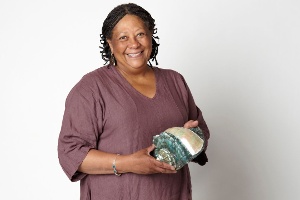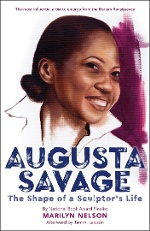Five questions for Marilyn Nelson
Through poetry that is captivating, evocative, and informative, Marilyn Nelson introduces readers to the life, work, and legacy of a prominent Harlem Renaissance sculptor in Augusta Savage: The Shape of a Sculptor’s Life (12 years and up, Ottaviano/Little, Brown).
Through poetry that is captivating, evocative, and informative, Marilyn Nelson introduces readers to the life, work, and legacy of a prominent Harlem Renaissance sculptor in Augusta Savage: The Shape of a Sculptor’s Life (12 years and up, Ottaviano/Little, Brown). See also our Black History Month and Black History Month 2022 coverage.
1. What drew you to writing about Augusta Savage? What did you know about her going in?
 Marilyn Nelson: I was drawn by curiosity and the sense of challenge. Here’s what I knew about Augusta Savage and her life and work going in: “Augusta Savage, Harlem Renaissance, influential, sculptor.” That’s it. I suppose some writers could spin a lot out of that minimal information, but I could see this would require a big commitment of time.
Marilyn Nelson: I was drawn by curiosity and the sense of challenge. Here’s what I knew about Augusta Savage and her life and work going in: “Augusta Savage, Harlem Renaissance, influential, sculptor.” That’s it. I suppose some writers could spin a lot out of that minimal information, but I could see this would require a big commitment of time.
2. What was your research like? Did you compile facts and then craft the poems, or did the poetic form help drive which information you chose to share?
MN: I read everything I could find about her. Reacquainted myself with the realities of the era. Wangled an invitation to the home and studio of my friend Meredith Bergmann, a noted contemporary sculptor. Read the books and articles about the craft of sculpting, which Meredith sent me home with. Went to NYC; Washington, DC; Chicago; and Saugerties, New York, to see several pieces of Savage’s work and try to see places through her eyes. The research came before the writing.
3. Did you have the artist’s work in view while creating your own art?
MN: I did have books, which contained photos of her work.
 4. What does your process look like when you write a concrete poem?
4. What does your process look like when you write a concrete poem?
MN: The process depends on the simplicity of the image I want to convey. Obviously the ducklings, tree, and circle poems were easier to write “free-hand.” I’m not even sure most readers will recognize Marcus Garvey’s profile in the left margin of the poem about him, which I really struggled with. Or the suggestion of the familiar outline of Madonna and Child. (The title and identifying information were originally two spaces above Mary’s head, like a halo.) The X (“Hitting Bottom”) and “The Harp” were sooooooooooo hard. I wish I had been able to take “The Harp” through several more drafts. I loved writing the poem shaped like a penguin!
5. What is one thing you learned about Augusta Savage that you wish would have fit into your poems about her?
MN: Biography and history require both research and imagination. Unless the subject has left a trail of crumbs in journals, letters, old calendars, etc., the biographer has to interpret, with imagination, the information she finds. Augusta seems to have been surprisingly solitary, and surprisingly private about her memories of the trauma of the beatings she received for being herself. I wondered, but felt I had no right to guess on paper, whether she forgave her father, and whether she forgave her mother for allowing those beatings to happen. Another writer might have gone on to imagine her father as cruel and abusive. I think he was probably a well-meaning, loving, ignorant, probably illiterate, fervent believer in what he heard and understood of the fundamental stories underpinning the Judeo-Christian tradition. I hope I’ve made the facts of her early life clear enough for readers to recognize how heartbreaking it is not to be allowed to live out a central trait of one’s identity.
From the January 2022 issue of Notes from the Horn Book.
RELATED
ALREADY A SUBSCRIBER? LOG IN
We are currently offering this content for free. Sign up now to activate your personal profile, where you can save articles for future viewing.







Add Comment :-
Be the first reader to comment.
Comment Policy:
Comment should not be empty !!!